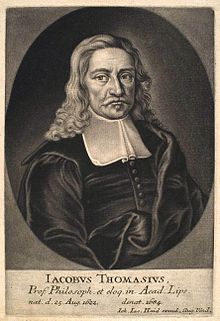Jakob Thomasius
Jakob Thomasius | |
|---|---|
 Jakob Thomasius (1622–1684) | |
| Born | 27 August 1622 |
| Died | 9 September 1684 Leipzig, Electorate of Saxony |
| Alma mater | University of Leipzig (B.A., 1642; M.A., 1643) |
| Scientific career | |
| Fields | Philosopher |
| Institutions | University of Leipzig |
| Academic advisors | Friedrich Leibniz |
| Doctoral students | Otto Mencke |
| Other notable students | Gottfried Leibniz |
| Notes | |
He was the father of Christian Thomasius and the brother of Johann Thomasius. | |

Jakob Thomasius (Latin: Jacobus Thomasius; 27 August 1622 – 9 September 1684) was a German academic philosopher and jurist. He is now regarded as an important founding figure in the scholarly study of the history of philosophy. His views were eclectic, and were taken up by his son Christian Thomasius.
Work
[edit]Thomasius was influential in the contemporary realignment of philosophy as a discipline. Martin Mulsow writes:[1]
According to Thomasius’ “Schediasma historicum” of 1665, from a theological point of view, philosophy needed to guarantee a clear separation of Creator from Creation, of God from Nature. It should thus only spring from Christian Aristotelianism, not from Stoicism or Neoplatonism.
He wrote on a wide range of topics, including Gnosticism, plagiarism and the education of women.
He was the teacher of Gottfried Leibniz at the University of Leipzig, where Thomasius was professor of Rhetoric and Moral Philosophy, remaining a friend and correspondent up until the early 1670s, and has been described as Leibniz's mentor.
He is perhaps best remembered now as the author of the first published attack on Spinoza's Theological-Political Treatise.[2][3] In Academic study of Western esotericism Thomasius is sometimes accredited as an intellectual watershed leading to the demise of the previously hegemonic Prisca theologia.[4]
Family
[edit]From 1653, Jacob Thomasius was married to Maria Weber, daughter of Archdeacon of St. Nicholas's Church and the extraordinary professor of the university Jeremiah Weber. Their children were the famous philosopher and lawyer Christian Thomasius (1655–1728), Doctor of medicine and physician in Nuremberg Gottfried Thomasius (born 1660) and Johanna (born 1663) – later the wife of professor of poetry and director of the University library in Leipzig Joachim Feller (1638–1691). Since Maria Weber died a few days after giving birth to her daughter, in 1664 Jacob Thomasius remarried with the widow of the rector of St. Peter's School. Nicholas was born Maria Elisabeth Hornschuh, nee Eichhorn, which brought him six more daughters and one son; among them, Maria Elisabeth (born 1665), the wife of Leipzig professor of theology Adam Rechenberg (1642–1721).
Bibliography
[edit]- Philosophia practica (1661)
- Schediasma historicum (1665)
- De foeminarum eruditione (1671) with Johannes Sauerbrei and Jacobus Smalcius
- Praefationes sub auspicia disputationum suarum (1681)
- Dissertationes ad stoicae philosophiae (1682)
- Orationes (1683)
Notes
[edit]- ^ M. Mulsow, "Practices of Unmasking" Archived 2007-06-26 at the Wayback Machine, p. 5.
- ^ Begley, Bartholomew (2018). "Naturalism and its political dangers: Jakob Thomasius against Spinoza's Theological-Political Treatise. A study and the translation of Thomasius' text". The Seventeenth Century. 34 (5): 649–670. doi:10.1080/0268117X.2018.1487876. S2CID 158911919.
- ^ Nadler, Steven (2011-10-09). A Book Forged in Hell: Spinoza's Scandalous Treatise and the Birth of the Secular Age. ISBN 9780691139890.
- ^ Hanegraaff, Wouter (2012). Esotericism and the Academy: Rejected Knowledge in Western Culture. Cambridge: Cambridge University Press. ISBN 978-0521196215.
Further reading
[edit]- Richard Sachse, Das Tagebuch des Rectors Jakob Thomasius, Leipzig 1894.
External links
[edit]- Works by or about Jakob Thomasius at the Internet Archive
- Mathematics Genealogy Project
- Thomasius' Neurotree profile
- "Jakob Thomasius". Biographisch-Bibliographisches Kirchenlexikon (BBKL) (in German).
- Jakob Thomasius in the German National Library catalogue
- Translation of Thomasius's critique of Spinoza
